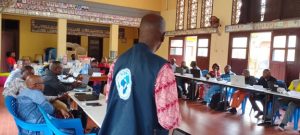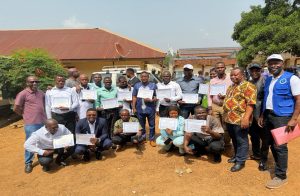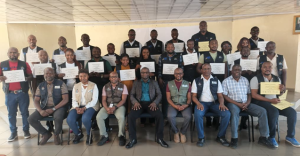AFENET forges partnerships to enhance public health system strengthening in South Sudan
-
by
AFENET
Developing and sustaining partnerships is an integral part of AFENET’s operations as it works with member countries to address priority public health issues. Partnerships maximize synergies amongst collaborating entities, ultimately enhancing the efficiency and quality of service provision. AFENET brings to the table the following attributes: capacity for speedy deployment of human and other resources within hours of an event; a continental-wide network of field epidemiologists experienced in working in challenging and hard to reach environments; its own platform for immortalizing work done across the continent through publications; a robust online financial and accounting system that supports operations 24 hours; a strong internal audit function that supports accountability and prudent use of donor resources; a unique relationship with ministries of health that enables us to be embedded seamlessly within and promotes host government ownership of interventions through alignment with MOH objectives and national programs; a robust range of partnerships with academic institutions, government agencies, multilateral agencies, foundations & corporations; being open to working in new & challenging opportunities; and a genuine desire for candid feedback.
AFENET seeks to expand its work in South Sudan, within the scope of its strategic priorities. On 28 March 2022, an AFENET delegation headed by the Director, Dr. Antara Simon met with the Country Director for CDC South Sudan – Dr. Sudhir Bunga. In his remarks, the latter remarked that in his more than 18 years with the US CDC, there is no agency better positioned than AFENET to spear head the field epidemiology training agenda in South Sudan and Africa as a whole. He pledged his continued support to the organization.

Similarly, a team at UNICEF South Sudan, headed by EPI Manager – Dr. Muhammad Tariq, appreciated the partnership with AFENET and highlighted opportunities for further collaboration during the implementation of the new South Sudan Country Program 2023 -2025 that will, among other things, focus on immunization. The team further called for more collaboration at field level where action takes place and advocated for a two-way feedback mechanism in order to achieve our common objectives.
In discussions with the WHO South Sudan Country Director -Dr. Fabian Ndenzako, AFENET’s Director appreciated the existing long standing relationship between the two institutions and highlighted the common alignment in activities of the two institutions. On his part, Dr. Ndenzako highlighted the human resource challenge in the South Sudan health system caused by minimal investment in the health sector. This is compounded by insecurity, cattle raids, and poor transport infrastructure. He welcomed AFENET on board the South Sudan landscape and advocated for formalization of the partnership between the two institutions through drafting of a memorandum of understanding (MOU).

In separate but related discussions with senior officials of the South Sudan Ministry of Health, the Undersecretary – Dr. Victoria Aniip Majur and the Director Preventive Health Services – Dr. John Rumunu, who also doubles as the Program Director South Sudan FETP, both expressed gratitude to AFENET for spearheading the field epidemiology training agenda in the country in liaison with other development partners. They expressed interest in continued partnership with AFENET and promised full support for the development of all tiers of FETP training: frontline, intermediate and advanced levels. They also guaranteed MoH ownership of the FETP and clear career pathways for FETP graduates as the country strives to build the much needed body of public health professionals with expertise to lead outbreak investigation and response efforts.
For a continental-wide network which has footprint in more than 31 countries, collaboration defines us and is the hallmark of our existence. As we strive to achieve our strategic objective of Networking and Collaboration for Public Health Advancements, AFENET will leave no stone unturned in forging these partnerships and will continue to nurture them in all operational areas across the continent. With support from these partners, AFENET will continue to be the organization of choice when it comes to public health surveillance and response in Africa.



